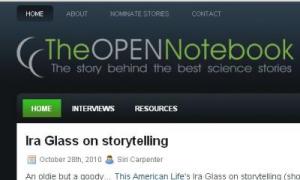On science blogs this week: Elect
by Tabitha M. Powledge (@tamfecit)
[We have an RSS feed. No orange icon, but <a href="http://www.nasw.org/rss.xml "target="_new" class="reglink">click here. If that doesn't work, the URL is http://www.nasw.org/rss.xml]
THE OPEN NOTEBOOK OPENS UP SCIENCE WRITING. This edition will be very short, but I wanted to make sure you knew about The Open Notebook ("The Story Behind the Best Science Stories"). The Open Notebook is the brand-new site/blog put together by science journalists Siri Carpenter and Jeanne Erdman. (Siri and Jeanne are also the new co-chairs of the National Association of Science Writers Freelance Committee, Freecom for short. And, needless to mention, friends.)
In an email announcement on an NASW listserv, Jeanne explained that The Open Notebook will be:
a craft-focused website for science journalists that ... goes behind the scenes of outstanding science stories, interviewing writers about how they got the idea for a particular story, sharpened the pitch, and reported and wrote the story. We ask writers nuts-and-bolts questions about such things as the steps they took to vet their ideas, how they gained access to certain sources, what challenges they encountered in reporting or writing and how they approached those challenges.
The site is starting with a bang, with a handful of well-known science writers talking about how they put together their prize-winning pieces. But wait, there's more. The packages also include successful pitches, outlines and notes, and excerpts from early drafts, so you can peer over the writers' shoulders as they build their work. This unusual background material makes the examples uniquely useful to folks in our trade.
ELECTION DAY NEXT TUESDAY. So let's go with a few science-related blog posts that analyze and/or illuminate the voting process:
Washington's Abortive Scientific Renaissance. Emily Badger interviews Chris Mooney for Miller-McCune Online.
On Health Overhaul, GOP Pollsters Are From Andromeda And Dems The Milky Way. On NPR's health care blog Shots, Julie Rovner recounts that what the pollsters say about the new health care law's impact on voters depends on which party they're working for. That may not be astonishing, but since polling is supposed to be scientific, it surely is depressing.
NCBI ROFL: How dark is Obama's skin? Depends on whether you voted for him. At Discoblog, Jennifer Welsh reprints the PubMed abstract for the paper "Political partisanship influences perception of biracial candidates' skin tone."
See also NCBI ROFL: Surprise! Men vote for the hotter female candidate. This time the paper is "The political gender gap: gender bias in facial inferences that predict voting behavior." Duh.
The Brain in the Voting Booth: How hidden biases influence our vote. At Scienceline, from the NYU Science, Health, and Environmental Reporting Program, Lena Groeger briefly describes assorted unconscious inclinations that influence voting choices.
Why Pot Legalization Is the Most Important Issue Before Voters This Election Day. You may not agree, but at the Huffington Post, Reason editors Nick Gillespie and Matt Welch try to convince you.
Let's hope there isn't political pressure on prostate CA screening recommendations. Gary Schwitzer's HealthNewsReview commends Katherine Hobson at the WSJ Health blog for her speculation that the reason the US Preventive Services Task Force cancelled its meeting, scheduled for next Monday and Tuesday, may have been that it was to consider recommendations on the inflammatory topic of prostate cancer screening. (You may recall that a year ago the Task Force got into very hot political water over its conservative recommendations on breast cancer screening.) As a conspiracy theory, I find that a little unpersuasive; Hobson herself points out that the recommendations won't be issued until some weeks after the meeting, long after the election. I suppose they might be leaked during the meeting, but it's hard to see how the recommendations, whatever they are, could have time to have an impact on Tuesday's voting — especially since 30-some states now have early voting and therefore election day itself is much less important than it used to be.
FINALLY, ALTHOUGH NEARLY TOO LATE FOR THIS ELECTION SEASON Lifehacker has some suggestions for possibly maybe perhaps preventing future political (and other) robocalls, and the commenters chime in with more. Press #? It couldn't be that easy, could it?

